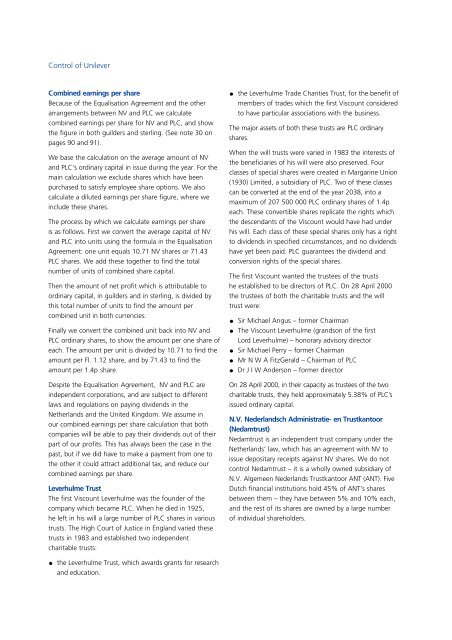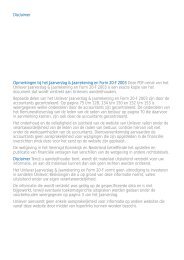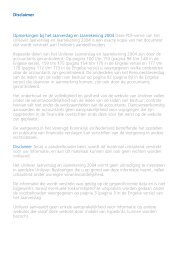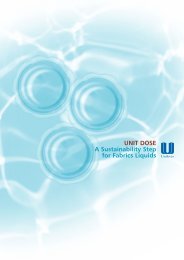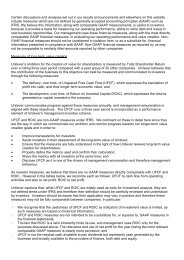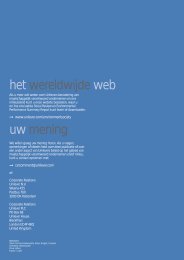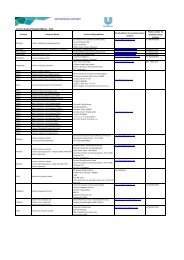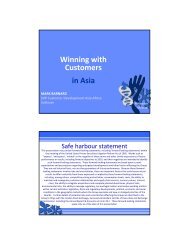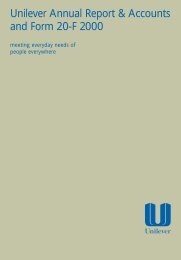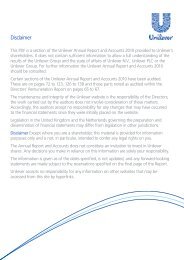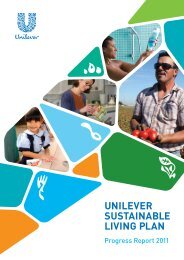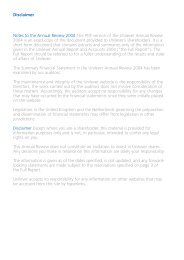Meeting everyday needs of people everywhere - Unilever
Meeting everyday needs of people everywhere - Unilever
Meeting everyday needs of people everywhere - Unilever
You also want an ePaper? Increase the reach of your titles
YUMPU automatically turns print PDFs into web optimized ePapers that Google loves.
Control <strong>of</strong> <strong>Unilever</strong><br />
Combined earnings per share<br />
Because <strong>of</strong> the Equalisation Agreement and the other<br />
arrangements between NV and PLC we calculate<br />
combined earnings per share for NV and PLC, and show<br />
the figure in both guilders and sterling. (See note 30 on<br />
pages 90 and 91).<br />
We base the calculation on the average amount <strong>of</strong> NV<br />
and PLC’s ordinary capital in issue during the year. For the<br />
main calculation we exclude shares which have been<br />
purchased to satisfy employee share options. We also<br />
calculate a diluted earnings per share figure, where we<br />
include these shares.<br />
The process by which we calculate earnings per share<br />
is as follows. First we convert the average capital <strong>of</strong> NV<br />
and PLC into units using the formula in the Equalisation<br />
Agreement: one unit equals 10.71 NV shares or 71.43<br />
PLC shares. We add these together to find the total<br />
number <strong>of</strong> units <strong>of</strong> combined share capital.<br />
Then the amount <strong>of</strong> net pr<strong>of</strong>it which is attributable to<br />
ordinary capital, in guilders and in sterling, is divided by<br />
this total number <strong>of</strong> units to find the amount per<br />
combined unit in both currencies.<br />
Finally we convert the combined unit back into NV and<br />
PLC ordinary shares, to show the amount per one share <strong>of</strong><br />
each. The amount per unit is divided by 10.71 to find the<br />
amount per Fl. 1.12 share, and by 71.43 to find the<br />
amount per 1.4p share.<br />
Despite the Equalisation Agreement, NV and PLC are<br />
independent corporations, and are subject to different<br />
laws and regulations on paying dividends in the<br />
Netherlands and the United Kingdom. We assume in<br />
our combined earnings per share calculation that both<br />
companies will be able to pay their dividends out <strong>of</strong> their<br />
part <strong>of</strong> our pr<strong>of</strong>its. This has always been the case in the<br />
past, but if we did have to make a payment from one to<br />
the other it could attract additional tax, and reduce our<br />
combined earnings per share .<br />
Leverhulme Trust<br />
The first Viscount Leverhulme was the founder <strong>of</strong> the<br />
company which became PLC. When he died in 1925,<br />
he left in his will a large number <strong>of</strong> PLC shares in various<br />
trusts. The High Court <strong>of</strong> Justice in England varied these<br />
trusts in 1983 and established two independent<br />
charitable trusts:<br />
•<br />
the Leverhulme Trust, which awards grants for research<br />
and education.<br />
•<br />
the Leverhulme Trade Charities Trust, for the benefit <strong>of</strong><br />
members <strong>of</strong> trades which the first Viscount considered<br />
to have particular associations with the business.<br />
The major assets <strong>of</strong> both these trusts are PLC ord i n a r y<br />
s h a re s .<br />
When the will trusts were varied in 1983 the interests <strong>of</strong><br />
the beneficiaries <strong>of</strong> his will were also preserved. Four<br />
classes <strong>of</strong> special shares were created in Margarine Union<br />
(1930) Limited, a subsidiary <strong>of</strong> PLC. Two <strong>of</strong> these classes<br />
can be converted at the end <strong>of</strong> the year 2038, into a<br />
maximum <strong>of</strong> 207 500 000 PLC ordinary shares <strong>of</strong> 1.4p<br />
each. These convertible shares replicate the rights which<br />
the descendants <strong>of</strong> the Viscount would have had under<br />
his will. Each class <strong>of</strong> these special shares only has a right<br />
to dividends in specified circumstances, and no dividends<br />
have yet been paid. PLC guarantees the dividend and<br />
conversion rights <strong>of</strong> the special shares.<br />
The first Viscount wanted the trustees <strong>of</strong> the trusts<br />
he established to be directors <strong>of</strong> PLC. On 28 April 2000<br />
the trustees <strong>of</strong> both the charitable trusts and the will<br />
trust were:<br />
•<br />
•<br />
•<br />
•<br />
•<br />
Sir Michael Angus – former Chairman<br />
The Viscount Leverhulme (grandson <strong>of</strong> the first<br />
Lord Leverhulme) – honorary advisory director<br />
Sir Michael Perry – former Chairman<br />
Mr N W A FitzGerald – Chairman <strong>of</strong> PLC<br />
Dr J I W Anderson – former director<br />
On 28 April 2000, in their capacity as trustees <strong>of</strong> the two<br />
charitable trusts, they held approximately 5.38% <strong>of</strong> PLC’s<br />
issued ordinary capital.<br />
N.V. Nederlandsch Administratie- en Trustkantoor<br />
(Nedamtrust)<br />
Nedamtrust is an independent trust company under the<br />
Netherlands’ law, which has an agreement with NV to<br />
issue depositary receipts against NV shares. We do not<br />
control Nedamtrust – it is a wholly owned subsidiary <strong>of</strong><br />
N.V. Algemeen Nederlands Trustkantoor ANT (ANT). Five<br />
Dutch financial institutions hold 45% <strong>of</strong> ANT’s shares<br />
between them – they have between 5% and 10% each,<br />
and the rest <strong>of</strong> its shares are owned by a large number<br />
<strong>of</strong> individual shareholders.


